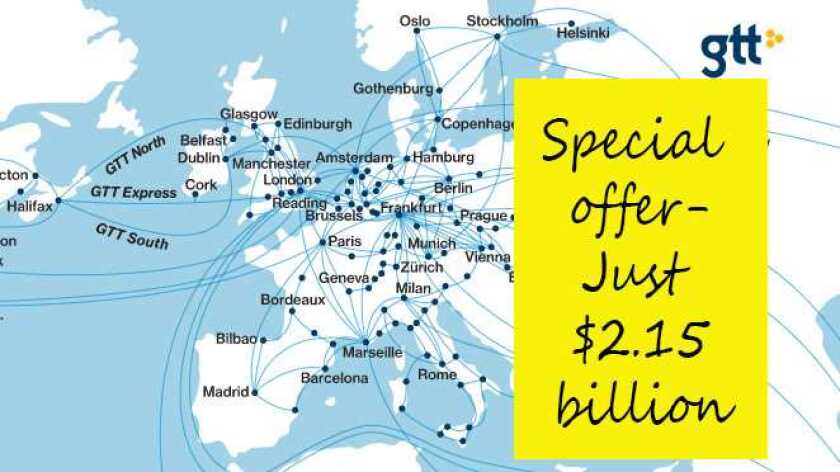That is $150 million more than industry sources were talking about last week, when the figure mentioned was $2 billion.
Meanwhile GTT says the review which has led to its late filing of its quarterly returns has identified “material weaknesses”, possibly dating back to 2016.
And it has parted company with its principal accounting officer, Dan Fraser.
Only 12 days ago sources were telling Capacity: “Current shareholders will be upset if the price [for the infrastructure division] is below $1.9 billion.”
The shareholders are likely to be delighted by GTT’s filing to the US Securities and Exchange Commission (SEC), which says the company has “a non-binding offer relating to the potential sale of the infrastructure division that would value the infrastructure division at an enterprise value of approximately $2.15 billion”.
The main component of the infrastructure division is the former Interoute, which GTT bought in May 2018 for $2.3 billion.
The year before, in January 2017, GTT bought Hibernia Networks for $590 million, and Hibernia is bundled in with Interoute – a package GTT has called Apollo in its sales process, managed by Goldman Sachs and Credit Suisse.
GTT says the infrastructure package is the “highly differentiated terrestrial pan-European fibre network, subsea transatlantic fibre and data centre infrastructure that were part of the Interoute and Hibernia acquisitions”.
GTT confirmed that the consortium that is in negotiation consists of UK-based 3i Infrastructure plus pension fund AustralianSuper and Australian bank Macquarie Capital.
“There is currently no binding agreement between the company and the consortium for the sale of the infrastructure division, and reaching a binding agreement would be subject to the consortium’s on-going due diligence and the negotiation of the terms and conditions of a definitive agreement and certain ancillary agreements,” warns GTT.
Meanwhile, in the same SEC statement, GTT says it is parting with Dan Fraser, its senior vice president and corporate controller, who was also its principal accounting officer.
He leaves next Tuesday, taking four months of his annual salary of $771,633 and health insurance premiums for up to 12 months.
GTT includes a third item in the same SEC statement, though makes no direct connection between Fraser’s departure and the company’s late filing of its results for the quarter ending 30 June – for which it has already been slapped on the wrist by the New York Stock Exchange.
Some have speculated that the delay in filing returns has delayed GTT’s sale of its infrastructure division.
GTT has set up a review of the financial statement “and previously issued financial statements, as well as whether there are any material weaknesses in the company’s internal controls”.
The review has already identified a number of issues in connection with the company’s previously issued financial statements. These include, in 2019 and up to the end of the first quarter of this year, “adjustments made without adequate support to cost of telecommunications services … that had the effect of removing expenses from the company’s income statement at quarter-end and then recognising certain of those expenses in subsequent quarters”.
And in 2017 and 2018, there were “failures … to recognise certain expenses on the company’s income statement by recording such expenses to goodwill and thereby attributing such expenses to pre-acquisition accruals, without adequate support, for companies that had been acquired”.
The audit committee is going back to 2016, GTT said in its statement. “The review has not identified any issues with the company’s accounting for its previously reported revenues or cash and cash equivalents balances.”
It warns: “At the conclusion of the review, the company expects the review to identify material weaknesses in the company’s internal control over financial reporting, and the company intends to continue to evaluate and implement remedial measures to address any such material weaknesses.”






